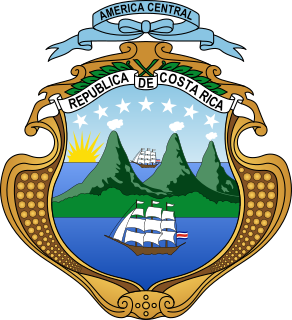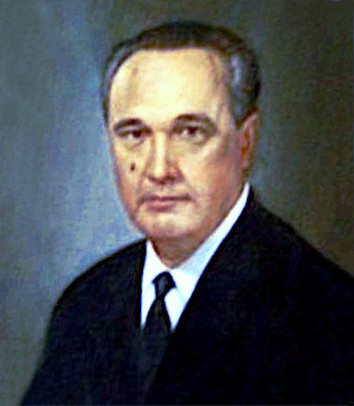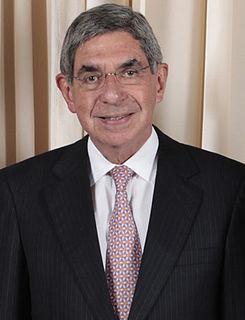| ||||||||||||||||||||
| Turnout | 67% | |||||||||||||||||||
| ||||||||||||||||||||
Provinces won by Figueres | ||||||||||||||||||||
| ||||||||||||||||||||
 |
|---|
| This article is part of a series on the politics and government of Costa Rica |
Legislature |
|
General elections were held in Costa Rica on 26 July 1953. [1] José Figueres Ferrer of the National Liberation Party won the presidential election, whilst his party also won the parliamentary election. Voter turnout was 67.2 percent in the presidential election and 67.5 percent in the parliamentary election. [2]

Costa Rica, officially the Republic of Costa Rica, is a country in Central America, bordered by Nicaragua to the north, the Caribbean Sea to the northeast, Panama to the southeast, the Pacific Ocean to the southwest, and Ecuador to the south of Cocos Island. It has a population of around 5 million in a land area of 51,060 square kilometers. An estimated 333,980 people live in the capital and largest city, San José with around 2 million people in the surrounding metropolitan area.

José María Hipólito Figueres Ferrer served as President of Costa Rica on three occasions: 1948–1949, 1953–1958 and 1970–1974. During his first term in office he abolished the country's army, nationalized its banking sector, and granted women and Afrodescendents the right to vote, as well as access to Costarrican nationality to people of African descent. He was a good friend of the Governor of Puerto Rico, Luis Muñoz Marín, praising his political achievements in one of his essays.

The National Liberation Party, nicknamed the verdiblancos, is a political party in Costa Rica. The party is a member of the Socialist International.
Contents
This was Costa Rica’s first election since the end of the 1948 Civil War, and democratic guarantees were not fully restored.
The Costa Rican Civil War was the bloodiest event in 20th-century Costa Rican history. It lasted for 44 days, during which approximately 2,000 people are believed to have died. The conflict was precipitated by the vote of the Costa Rican Legislature, dominated by pro-government representatives, to annul the results of the presidential elections held in February, alleging that the triumph of opposition candidate Otilio Ulate had been achieved by fraud.

Democracy is a system of government where the citizens exercise power by voting. In a direct democracy, the citizens as a whole form a governing body and vote directly on each issue. In a representative democracy the citizens elect representatives from among themselves. These representatives meet to form a governing body, such as a legislature. In a constitutional democracy the powers of the majority are exercised within the framework of a representative democracy, but the constitution limits the majority and protects the minority, usually through the enjoyment by all of certain individual rights, e.g. freedom of speech, or freedom of association. "Rule of the majority" is sometimes referred to as democracy. Democracy is a system of processing conflicts in which outcomes depend on what participants do, but no single force controls what occurs and its outcomes.
José Figueres, the caudillo of the victorious National Liberation Army faction in the Civil War, was the candidate of the newly founded National Liberation Party (PLN). [3] Liberal Mario Echandi tried to be the candidate from then-ruling National Union Party (PUN), but his candidacy was denied by the Electoral Tribunal due to purported irregularities in the adherents' signatures. [3] This move was highly criticized by Figueres' opponents as an action in favor of Figueres' candidacy. [3]

The National Union Party is the name of several liberal conservative parties in Costa Rica, generally located right-to-center in the political spectrum.
As PUN was unable to participate, the only other candidacy alternate to Figueres was made by the Democratic Party, which nominated wealthy industrial magnate Fernando Castro Cervantes. [3] The three parties—PLN, PUN and Democratic—were all formerly united in opposition against the 1940s governments of Rafael Angel Calderón and his allies, who were viewed as having caused the civil war. Yet, after the war, such unification ceased. [3]

Rafael Ángel Calderón Guardia was a Costa Rican doctor and politician, who served as President from 1940 to 1944.
The losing sides in the civil war, mostly the Republicans (Calderón supporters) and the Communists, were unable to participate as the Republicans' party was disbanded and the Communist Party was constitutionally outlawed. [3] The Republicans were nonetheless allowed to participate in the legislative ballot with a provincial party in San José called the "Independent" Republican Party, and thereby gained some seats. As expected, Figueres won by a landslide victory. [3]

The National Republican Party was a political party in Costa Rica.

The People's Vanguard Party, or Popular Vanguard Party is a communist party in Costa Rica. PVP was founded in 1931 as the Workers and Farmers Party, but was soon renamed to the Communist Party of Costa Rica.

San José is a province of Costa Rica. It is located in the central part of the country, and borders the provinces of Alajuela, Heredia, Limón, Cartago and Puntarenas. The provincial and national capital is San José. The province covers an area of 4,965.9 km². and has a population of 1,404,242.
















